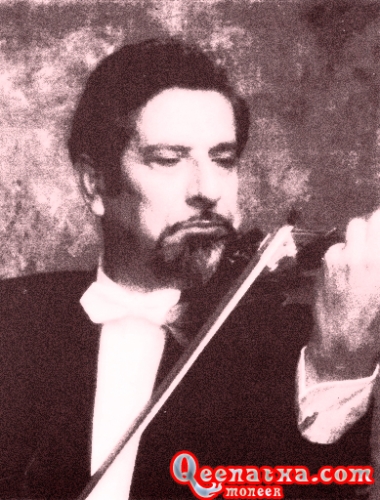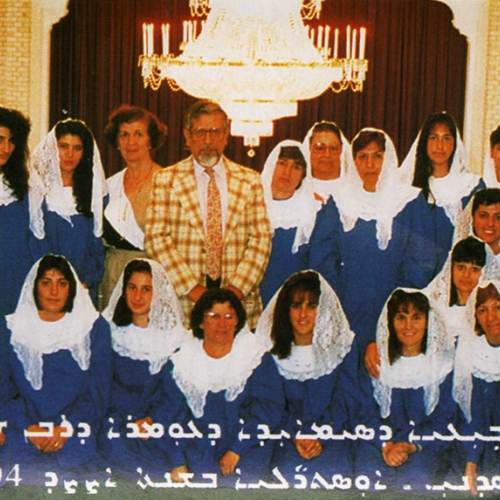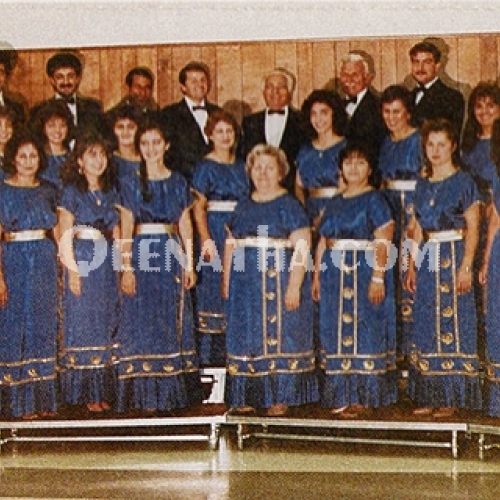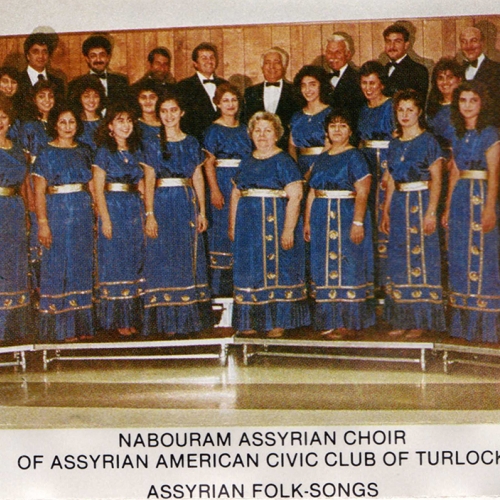Rabi Alexander (Shoora) Mikhailian
Details
- Artist Type
- Musician
- Biography
-
"A firm and valid cornerstone of the folklore of every country is their local tunes and native songs. Shoora has devoted endless time and energy into livening up the hearts of those privileged enough to have heard his tunes"
Alexander (Shoora) Michailian:Alexander (Shoora) Michailian, son of Peera and Anna, was born in the ciry of Kharkov, Ukraine-Russia in 1930. He was the middle child to two brothers, the eldest, Wiluelm, and the youngest, Youri. The family immigrated to Iran in 1938, settling in Hamadan, After the death of his father, however, Shoora’s mother moved the family to Abadan, Iran in 1949. After about 20 years of living and working in Abadan, Shoora’s next move was to Iran’s capital, Tehran, in 1969, where he spent the rest of his years in Iran.
In 1980, Shoora, his wife, Lily, and daughter, Sabrina, immigrated to the United States of America and settled in Flint, Michigan for a short period of two years. The Michailian family then moved to Modesto, California for another two years before settling in Turlock, California in 1984. Whilst in Modesto, California in 1982, Sabrina bewedded Mr. Belis Daniels and left for Australia. The Michailian’s final and permanent move has been to Sydney Australia in 1998, where they are currently residing with their daughter and her family.
Shoora has made his musical mark wherever he has settled throughout his life, and still continues to do so ever so passionately.
A Passion for Music
Shoora’s passion for music was evident to his parents especially his mother, from an early age. As a child he used to gather all the kids in his neighbourhood and lead them marching up and down the neighbourhood blocks playing their basic instruments. During their years in Russia, upon discovery of their son’s hidden talents, Shoora’s parents placed him under the direction of two famous Russian music professors, Mr. Wichman and Mr. Shendro, at The School of Music in the city of Homel, Belorussia, to study classical violin. He attained proficiency in violin performance at an early age, and his diligent hard work paid off when as an eight-year-old he was to have his first recital in his school of music in front of parents and teachers.
After immigrating to Iran, Shoora, when at the age of about twelve, met the renowned Assyrian musician, the late Rabi William Daniel, and in turn became a student of his.
This musical flair does not stop with Shoora, as it is evident in the other members of his family, especially his grandson David Daniels, who is currently undergoing violin training with his grandfather and after performs violin duet pieces with Shoora. He also plays in the Opera House Youth Group.
Michailian’s daughter, Sabrina, and granddaughter Rumsina, have also undergone musical training on the piano, and his brother-in-law, Belis Daniels, sings and plays the guitar.
Accomplishments during Thirty Years of Musical Life in Iran.
"Both his ingenuity with the violin, and his leading role as the composer and conductor of numerous musical arrangements, including choral, instrumental and orchestral works, across many a country, have earned him honourable positions in his field as well as made him one of the most respected Assyrian musicians of our time"
This period in Shoora’s life was spent working mainly in the national capital, Tehran, where most of Iran’s musical life was centered. However, during his years in Hamadan and Abadan he also attained the position of supervisor of musical for the Board of Education in both cities.
Upon his transfer to Abadan in 1949 that was facilitated by the Education Department in Hamadan, Shoora found himself in the company of many European musicians. In a short span of time, his musical talent and superb violin performance won the hearts of the audience in this territory. Whilst in Abadan Shoora established the first Assyrian band in the region and named it ‘The Eagle Band’. Every member of the band was Assyrian and one such member was the well-respected Assyrian musician of our times, Mr. Paulus Khofri. The main purpose of this band was to provide the entertainment for the employees of the Oil Company in Abadan. Further to this, Shoora established the first Nabouram Assyrian National Choir (which was also to be established in the USA in later years) in Abadan’s Assyrian Soosan Elementary School in 1966. His other musical involvements in Abadan included having under his direction the choir for the Education School Orchestra of Abadan, and the Abadan Technical School Choir.
Having achieved what he had in Abadan Shoora’s next transfer was to be to Tehran in 1969 for the King’s Coronation Ceremony celebrations, where he conducted the performance by Teheran’s Institute of Arts orchestra.
Subsequent to this and upon request by the Institute of Arts, Shoora was not to return to Abadan and thereby made Tehran his next home. In the Institute of Arts, he assumed the role of directing the 2-year music course undertaken by teachers.
Perhaps the focal point in the career of this Assyrian musician and educator came when Michailian received the Royal Award from the Shah of Iran for his special composition in the form of a choral work, for the celecration of the 2500th anniversary of the Persian Empire, in 1971, where guests of the Shah had gathered from all over the world.
In addition to being a composer and conductor of choral and orchestral groups, Shoora continued his role as supervisor of music for Board of Education in Tehran. In his capacity as such, he led his musical teams through many performances on significant occasions in the county, such as the King and Queen’s birthday celebrations.
During Iran’s participation in an Asian/European musical contest held at Bolonia, Italy in 1978, Michailian’s composition for children won the first place award, an event which was covered in Iranian and Italian newspapers. This award also won him the title of Director of Iran’s Ministry of Education.
In this position, one of Shoora’s duties was to act as a judge for Iran’s national music camp at Ramsar. This camp gave music students practice in both folk and classical music each July. On an exchange basis, students from Romania, Yugoslavia, Austria and other European countries also attended this annual camp.
Throughout his musical working life in Iran, Shoora was also responsible for the preparation of a regular music program for children on Iran’s State Radio. Further to this, he wrote the music scores for all the religious hymens of the Assyrian Church of the East, with the approval of His Holiness Mar Dinkha IV.
Shoora’s first extended travel outside Iran was in 1972 when, accompanied by his wife and daughter, he stayed in the USA, during which time he paid his first visit to Flint, Michigab, where journal Music writer Mr. James E. Harvey, interviewed him. In Harvey’s article on him, which was titled ‘Flint Visitor Provides Shah’s Music’, Shoora made reference to the basic difference between Iranian Music.
The highlight of maestro Shoora’s musical life in the USA was his establishment of the choral and instrumental group of approximately fifty member, Nabouram Assyrian National Choir and Orchestra of the Assyrian American Civic Club of Turlock, in January 1983. This club which was founded in 1946 by a group of local area Assyrians and which has served as a focal point for the growing Assyrian community while helping for future generations – was proud and privileged to be the only Assyrian American National Federation Affiliate to have a national choir and orchestra.
Nabouram, being under the direction of Michailian, had regular practices weekly, where each of its three parts – choir, orchestra and piano – would meet on a different day of the week. For concert, however, all three parts would collaborate in harmony and presents a beautiful program.
Nabouram contributed to promoting Assyrian culture and heritage by elaborating and livening Assyrian folklore music and presenting special folklore pieces in its concerts. Further to this, it familiarised its members with classical music techniques and teachings. It also had its own library of audio and video recordings. One of Nabouram’s major accomplishments had been familiarising other cultures through live performances at local schools, Universities and International Shows.
In the past, Nabouram had held concerts in Chicago. Illinois, Los Angeles, San Francisco, San Jose, Modesto, and Turlock, California. Programs have included participation in Assyrian New Year festivities, saluting of Assyrian graduates, State Conventions, Fourth of July functions, Martyr’s day, National Federation Conventions, annual talent shows, Christmas theatrical shows and musical presentations.
The Path ahead for our nation’s music and musicians dose not, from today’s perspective, seem to be incredibly promising. Such a statement is not coming from a negative attitude but from the simple observation that there is not a limited number of Assyrians willing to follow in the footsteps of such great musicians of our time as William Daniel, Shoora Michailian, Nebu Joel Issabey and Paulus Khofri.
Shoora believes that there is not enough interest and musical passion and desire instilled within the Assyrian youth of today so as to make them committed to preserving our nation’s folkloric music. We do not have enough teachers to pass on the musical language of our ancestors from generation to generation, instead we are finding our folk music being diluted from other nationalities.
Shoora Michailian.s achievements:
-Head of the Music Department in Tehran, Hamadan and Abadan, Iran.
-Director of the Fine Arts Department of Iran.s Ministry of Education.
-Musical instructor to Iran.s school teachers.
-Winner of the first place award for his composition for children during an Asian/European musical contest held at Bologna, Italy in 1987.
-Received the Royal award from the Shah of Iran for his special composition for the celebration of the 2500th anniversary of the founding of the Persian Empire.
-Wrote the music scores for all of the religious hymns of the Assyrian Church of the East, with the approval of His Holiness Mar. Dinkha IV.
Source: Purely Academic (TAAAS) 1999 Magazine.
2010 © Qeenatha.com
"A firm and valid cornerstone of the folklore of every country is their local tunes and native songs. Shoora has devoted endless time and energy into livening up the hearts of those privileged enough to have heard his tunes"
Alexander (Shoora) Michailian, son of Peera and Anna, was born in the ciry of Kharkov, Ukraine-Russia in 1930. He was the middle child to two brothers, the eldest, Wiluelm, and the youngest, Youri. The family immigrated to Iran in 1938, settling in Hamadan, After the death of his father, however, Shoora’s mother moved the family to Abadan, Iran in 1949. After about 20 years of living and working in Abadan, Shoora’s next move was to Iran’s capital, Tehran, in 1969, where he spent the rest of his years in Iran.
In 1980, Shoora, his wife, Lily, and daughter, Sabrina, immigrated to the United States of America and settled in Flint, Michigan for a short period of two years. The Michailian family then moved to Modesto, California for another two years before settling in Turlock, California in 1984. Whilst in Modesto, California in 1982, Sabrina bewedded Mr. Belis Daniels and left for Australia. The Michailian’s final and permanent move has been to Sydney Australia in 1998, where they are currently residing with their daughter and her family.
Shoora has made his musical mark wherever he has settled throughout his life, and still continues to do so ever so passionately.
A Passion for Music
Shoora’s passion for music was evident to his parents especially his mother, from an early age. As a child he used to gather all the kids in his neighbourhood and lead them marching up and down the neighbourhood blocks playing their basic instruments. During their years in Russia, upon discovery of their son’s hidden talents, Shoora’s parents placed him under the direction of two famous Russian music professors, Mr. Wichman and Mr. Shendro, at The School of Music in the city of Homel, Belorussia, to study classical violin. He attained proficiency in violin performance at an early age, and his diligent hard work paid off when as an eight-year-old he was to have his first recital in his school of music in front of parents and teachers.
After immigrating to Iran, Shoora, when at the age of about twelve, met the renowned Assyrian musician, the late Rabi William Daniel, and in turn became a student of his.
This musical flair does not stop with Shoora, as it is evident in the other members of his family, especially his grandson David Daniels, who is currently undergoing violin training with his grandfather and after performs violin duet pieces with Shoora. He also plays in the Opera House Youth Group.
Michailian’s daughter, Sabrina, and granddaughter Rumsina, have also undergone musical training on the piano, and his brother-in-law, Belis Daniels, sings and plays the guitar.
Accomplishments during Thirty Years of Musical Life in Iran.
"Both his ingenuity with the violin, and his leading role as the composer and conductor of numerous musical arrangements, including choral, instrumental and orchestral works, across many a country, have earned him honourable positions in his field as well as made him one of the most respected Assyrian musicians of our time"
This period in Shoora’s life was spent working mainly in the national capital, Tehran, where most of Iran’s musical life was centered. However, during his years in Hamadan and Abadan he also attained the position of supervisor of musical for the Board of Education in both cities.
Upon his transfer to Abadan in 1949 that was facilitated by the Education Department in Hamadan, Shoora found himself in the company of many European musicians. In a short span of time, his musical talent and superb violin performance won the hearts of the audience in this territory. Whilst in Abadan Shoora established the first Assyrian band in the region and named it ‘The Eagle Band’. Every member of the band was Assyrian and one such member was the well-respected Assyrian musician of our times, Mr. Paulus Khofri. The main purpose of this band was to provide the entertainment for the employees of the Oil Company in Abadan. Further to this, Shoora established the first Nabouram Assyrian National Choir (which was also to be established in the USA in later years) in Abadan’s Assyrian Soosan Elementary School in 1966. His other musical involvements in Abadan included having under his direction the choir for the Education School Orchestra of Abadan, and the Abadan Technical School Choir.
Having achieved what he had in Abadan Shoora’s next transfer was to be to Tehran in 1969 for the King’s Coronation Ceremony celebrations, where he conducted the performance by Teheran’s Institute of Arts orchestra.
Subsequent to this and upon request by the Institute of Arts, Shoora was not to return to Abadan and thereby made Tehran his next home. In the Institute of Arts, he assumed the role of directing the 2-year music course undertaken by teachers.
Perhaps the focal point in the career of this Assyrian musician and educator came when Michailian received the Royal Award from the Shah of Iran for his special composition in the form of a choral work, for the celecration of the 2500th anniversary of the Persian Empire, in 1971, where guests of the Shah had gathered from all over the world.
In addition to being a composer and conductor of choral and orchestral groups, Shoora continued his role as supervisor of music for Board of Education in Tehran. In his capacity as such, he led his musical teams through many performances on significant occasions in the county, such as the King and Queen’s birthday celebrations.
During Iran’s participation in an Asian/European musical contest held at Bolonia, Italy in 1978, Michailian’s composition for children won the first place award, an event which was covered in Iranian and Italian newspapers. This award also won him the title of Director of Iran’s Ministry of Education.
In this position, one of Shoora’s duties was to act as a judge for Iran’s national music camp at Ramsar. This camp gave music students practice in both folk and classical music each July. On an exchange basis, students from Romania, Yugoslavia, Austria and other European countries also attended this annual camp.
Throughout his musical working life in Iran, Shoora was also responsible for the preparation of a regular music program for children on Iran’s State Radio. Further to this, he wrote the music scores for all the religious hymens of the Assyrian Church of the East, with the approval of His Holiness Mar Dinkha IV.
Shoora’s first extended travel outside Iran was in 1972 when, accompanied by his wife and daughter, he stayed in the USA, during which time he paid his first visit to Flint, Michigab, where journal Music writer Mr. James E. Harvey, interviewed him. In Harvey’s article on him, which was titled ‘Flint Visitor Provides Shah’s Music’, Shoora made reference to the basic difference between Iranian Music.
The highlight of maestro Shoora’s musical life in the USA was his establishment of the choral and instrumental group of approximately fifty member, Nabouram Assyrian National Choir and Orchestra of the Assyrian American Civic Club of Turlock, in January 1983. This club which was founded in 1946 by a group of local area Assyrians and which has served as a focal point for the growing Assyrian community while helping for future generations – was proud and privileged to be the only Assyrian American National Federation Affiliate to have a national choir and orchestra.
Nabouram, being under the direction of Michailian, had regular practices weekly, where each of its three parts – choir, orchestra and piano – would meet on a different day of the week. For concert, however, all three parts would collaborate in harmony and presents a beautiful program.
Nabouram contributed to promoting Assyrian culture and heritage by elaborating and livening Assyrian folklore music and presenting special folklore pieces in its concerts. Further to this, it familiarised its members with classical music techniques and teachings. It also had its own library of audio and video recordings. One of Nabouram’s major accomplishments had been familiarising other cultures through live performances at local schools, Universities and International Shows.
In the past, Nabouram had held concerts in Chicago. Illinois, Los Angeles, San Francisco, San Jose, Modesto, and Turlock, California. Programs have included participation in Assyrian New Year festivities, saluting of Assyrian graduates, State Conventions, Fourth of July functions, Martyr’s day, National Federation Conventions, annual talent shows, Christmas theatrical shows and musical presentations.
The Path ahead for our nation’s music and musicians dose not, from today’s perspective, seem to be incredibly promising. Such a statement is not coming from a negative attitude but from the simple observation that there is not a limited number of Assyrians willing to follow in the footsteps of such great musicians of our time as William Daniel, Shoora Michailian, Nebu Joel Issabey and Paulus Khofri.
Shoora believes that there is not enough interest and musical passion and desire instilled within the Assyrian youth of today so as to make them committed to preserving our nation’s folkloric music. We do not have enough teachers to pass on the musical language of our ancestors from generation to generation, instead we are finding our folk music being diluted from other nationalities.
Shoora Michailian.s achievements:
-Head of the Music Department in Tehran, Hamadan and Abadan, Iran.
-Director of the Fine Arts Department of Iran.s Ministry of Education.
-Musical instructor to Iran.s school teachers.
-Winner of the first place award for his composition for children during an Asian/European musical contest held at Bologna, Italy in 1987.
-Received the Royal award from the Shah of Iran for his special composition for the celebration of the 2500th anniversary of the founding of the Persian Empire.
-Wrote the music scores for all of the religious hymns of the Assyrian Church of the East, with the approval of His Holiness Mar. Dinkha IV.
Source: Purely Academic (TAAAS) 1999 Magazine.
2010 © Qeenatha.com






